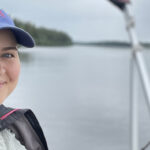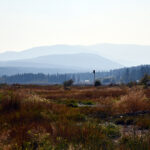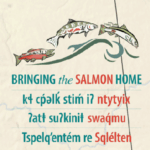Home »

These old guys are worth reading
Book Review
By Derryll White
Kaminsky, Stuart M. (1988). A Cold Red Sunrise.
“Moscow is a huge inspiration for me. I love what I find here, I love being here.” – Natalia Vodianova
 The author’s Inspector Porfiry Rostnikov series never disappoints. Stuart Kaminsky transports the reader to Moscow and always gives a knowledgeable tour of the landmarks and history of that formidable, besieged city. Somehow the residents come off the page, alive in the reader’s imagination as though one were watching a movie. It is a most benevolent gift the author gives, transforming the power and inequity of the Communist system into the needs, loves and hates of real (although fictional) people.
The author’s Inspector Porfiry Rostnikov series never disappoints. Stuart Kaminsky transports the reader to Moscow and always gives a knowledgeable tour of the landmarks and history of that formidable, besieged city. Somehow the residents come off the page, alive in the reader’s imagination as though one were watching a movie. It is a most benevolent gift the author gives, transforming the power and inequity of the Communist system into the needs, loves and hates of real (although fictional) people.
Rostnikov always struggles under the oppressive thumb of the KGB, the state security system that spawned Vladimir Putin. They do not treat him well but his nature is such that he serves the state honestly and to the best of his abilities, while refusing to compromise his own strong moral code. Nicknamed “Washtub” the amateur power weightlifter conquers or sidesteps many adversities here, in his assignment to a small ice station in Siberia.
There are many explorations in this novel – state, religion, history. Kaminsky always pushes the known and familiar, demanding that his readers think outside the box. He spends time on secondary characters, developing them in quirky ways that help him to explore the depths of state control and general human desire and misery. Kaminsky’s exploration of Russia is rich in detail and encourages further exploration of the Russian character and culture.
Stuart Kaminsky, John D. MacDonald, Raymond Chandler and others took an undeveloped pulp fiction genre and gave it form. Their characters were some of the first to begin questioning power and authority, exploitation and environmental decay, sexual usury and sexism itself. They were the explosion of the 1940s and 1950s that made the way for Carl Hiaasen, Harlan Coben, Lee Child and others successful in the mystery genre today. These old guys are worth reading.
********
Excerpts from the novel:
ICE CREAM – Ice cream is the Soviet Union’s most popular dessert. It is eaten not only in the summer but in the winter. It is eaten in enormous quantities. In Moscow alone more than 170 tons of ice cream are consumed each day and visitors report that the ice cream in Moscow runs second in taste only to that of Italy and is probably equal to that of France and the United States.
SIBERIA – The name Siberia means “SLEEPING LAND” and for more than a thousand years while the rest of Europe and Asia were developing a history most of Siberia slept. Beneath the sleeping giant whose five million square miles could swallow all the countries of Western Europe and could hold almost two countries the size of the United States lay vast riches including coal, oil, iron, gold, silver and diamonds. On the sleeping giant’s back grew millions of square miles of timber in the sprawling taiga, the forests which even today serve as massive havens for wolves, tigers and bears who have never experienced civilization and know nothing of its existence. Other animals, fox, mink, sable, roamed and multiplied and still roam wild.
SELF-APPRAISAL – “Why did you leave the church?”
 Galich shrugged. “Crisis of faith. No, actually there was no crisis of faith. It was a question of too much passion. I simply accepted one morning when I was about to go to the church that I never had any real faith, that I had endured the church because my family had always been leaders in the church back in Suzdal. The oddity is that had it not been for the Revolution, the Party, I would have left the church as a young man. I said things, did things even then that did not fit the image of the contemplative priest. I persisted, entered the priesthood because I didn’t want to be considered a coward. Ironic, isn’t it? I convinced myself that I believed but I knew that I could not reject the church because my family, the congregants, would think was afraid of the Party.”
Galich shrugged. “Crisis of faith. No, actually there was no crisis of faith. It was a question of too much passion. I simply accepted one morning when I was about to go to the church that I never had any real faith, that I had endured the church because my family had always been leaders in the church back in Suzdal. The oddity is that had it not been for the Revolution, the Party, I would have left the church as a young man. I said things, did things even then that did not fit the image of the contemplative priest. I persisted, entered the priesthood because I didn’t want to be considered a coward. Ironic, isn’t it? I convinced myself that I believed but I knew that I could not reject the church because my family, the congregants, would think was afraid of the Party.”
“But you did quit.”
“I did.”
DEMONS – “What did he say?” asked Rostnikov.
“He said that we should tell Mirasnikov when he awakens that there is no longer a need for demons, that there has been no need for demons since the whites came across the mountains and brought their own demons within their souls.”
“Religious philosophy,” said Rostnikov.
“Of the highest order,” Galich agreed. “Of the very highest order.”
 – Derryll White once wrote books but now chooses to read and write about them. When not reading he writes history for the web at www.basininstitute.org.
– Derryll White once wrote books but now chooses to read and write about them. When not reading he writes history for the web at www.basininstitute.org.







